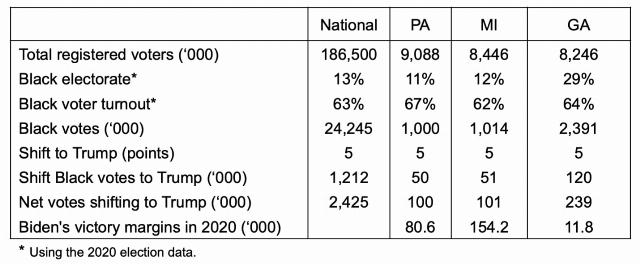Could black voters win Trump the presidency?
Kamala Harris is facing significant challenges with black voters. A New York Times/Siena College poll from early October showed 15% of Black voters supporting Trump, while 78% back Harris. A more recent report by USA Today paints an even bleaker picture: 72% of black voters support Harris, while 17% back Trump. For Democrats, dropping below 80% support from black voters nationally could be a serious blow.
This shift is not driven by misogyny, as some, including Barack Obama, have suggested, but rather by dissatisfaction with the Biden-Harris administration’s economic policies. Inflation, which has risen more than 22% between 2020 and 2024, has disproportionately affected black Americans, particularly low-income households that are already struggling with rising costs for necessities like housing, food, and transportation.
Between 2020–2024, the average rent has increased by 33.7%. With approximately 58% of black households being renters, this high increase hit them particularly hard. In 2023, over 56% of black renters were spending more than 30% of their income on housing.
The question is, will a shift in black votes harm Harris and help bring Trump back to the White House?
Assume Trump gains a 5-point increase in black votes. This is a reasonable assumption, given that he saw a 4-point rise in black support from 2016 to 2020. Such a shift could mean a net shift of 2.42 million votes nationally and significantly tip the balance in key swing states like Pennsylvania, Michigan, and Georgia (See the table for detailed projections).

Image created by author.
These states could be key to Trump’s victory. If Trump wins North Carolina and Florida, which are likely, he would only need to win Pennsylvania, Michigan, and Georgia to secure the election. He could even afford to lose Michigan if he wins Nevada. Hence, Pennsylvania and Georgia emerge as the ground zero for this election.
In Pennsylvania, there are 9.1 million registered voters, with 11% being black. A 5-point shift could translate into 100,000 additional votes for Trump, potentially erasing Biden’s victory margin from 2020. Similarly, in Michigan, with 8.4 million registered voters and a 12% black electorate, a 5-point shift could mean a net gain of 101,000 votes for Trump—although this alone may not be enough to overcome Biden’s 2020 margin.
Georgia, with its large black electorate (29% of voters), is particularly critical. In 2020, Trump won 11% of the black vote in Georgia. A 5-point shift in 2024 could net Trump an additional 240,000 votes, more than enough to surpass Biden’s 11,800-vote margin from 2020. Even focusing only on black men, who make up 11% of Georgia’s voters, a 5-point shift could give Trump a net gain of 91,000 votes—again, a significant margin compared to the 2020 results.
2020 vs 2024 and Historical Precedent
The 2020 election combined both normal and abnormal elements. The most notable anomaly was the unusually high 43% mail-in voting rate. Politically, there was no expectation that Biden and the Democrats would lose significant support from key demographic groups like black and Hispanic voters, as we are seeing now. The COVID-19 pandemic disrupted socioeconomic life, causing many to judge the incumbent president harshly. And despite Biden’s flaws, he wasn’t weathering a global economic shutdown in 2020, making the economic environment very different from today’s challenges.
Today, the economy and illegal immigration have emerged as top concerns. As the incumbent, Harris not only bears the burden and blame but is also perceived as less competent on these two issues. In modern American politics, no incumbent has been re-elected when voters view them as responsible for creating or worsening a bad economy.
Harry Truman defied the odds in 1948. Despite significant economic challenges, he won re-election with a vigorous campaign, strong rhetoric, solid support from labor unions, and the advantage of divisions within the Republican Party. In contrast, Kamala Harris finds herself in the opposite situation: facing economic dissatisfaction, splits within labor unions, a weak campaign with poor communication skills, and a more energized Republican base, making her path to victory much more difficult.
If any questionable anomalies arise during extended vote counts in critical swing states, potentially tipping the balance of the election, the public may perceive a legitimate basis for the opposing party to contest the results. This could lead to heightened scrutiny and challenges over the integrity of the election process, especially in tightly contested races.
Potential Long-Term Effects
For the past 50 years, Democrat presidential candidates have consistently secured around 90% of the black vote, compared to just 9% for Republicans—a 10:1 ratio. However, we may now be witnessing a significant realignment of the black voting bloc. Unlike many post-Reagan Republicans, Trump has a unique ability to drive this shift. While critics often dismiss his appeal as mere cult of personality, they overlook a key factor: his passionate embrace of the American spirit. His “Make America Great Again” and “America First” messages resonate deeply with many Americans who believe the ruling elites from both parties are selling the country to the highest bidder.
This sentiment is gaining traction among a growing number of black voters who also feel they have been taken for granted by Democrats for decades. More black voters are reconsidering their political loyalties, giving Trump and the Republican Party a second look. Trump tapped into this sentiment, famously asking black voters, “What do you have to lose?” If this realignment materializes in this election, it could not only bring Trump back to the White House but also reshape American politics for years to come.

Image: Johnny Silvercloud, CC BY-SA 2.0, via Flickr, unaltered.
FOLLOW US ON
Recent Articles
- Jay Leno, Dementia, and the Impermanence of Life
- We Must Teach Children to Love Freedom More Than Government
- Judge Not
- A Good Day For The Navy
- Woke Ideology Requires Antisemitism
- Trump and the Public Trust
- Trump’s First 100 Days: A Scorecard of Wins, Waits, and Wobbles
- Larry David: No Longer the Master of his Comedic Domain
- Mass deportations without ICE enforcement
- Harvard’s Tax-Exempt Status and Religion-Based Bequests
Blog Posts
- Forget Trump’s blue suit. What about those so-called ‘transgender’ mourners at the Pope’s funeral?
- About those port explosions in Iran *UPDATED*
- Shedeur Sander’s fall from grace
- There goes the sun?
- Trump’s 'come to Jesus’ moment on Ukraine, at Pope Francis’s funeral
- Reflections on a papal visit
- When the center-fielder saved the flag
- What vote by mail gets you
- A real deterrent for violent criminals
- Recruiting mysteriously, dramatically, increases
- Climate scientists want to shut off the sun
- Drone footage shows Pacific Palisades reservoir still empty
- Biden pops up at the pope's funeral, looking lost
- The mind-numbing, innovation-destroying DEI permeating Washington State government *UPDATED*
- Leftism is killing chocolate






